#Ancient Greek translation
Text
Come, shining lyre, speak to me--gain the power of utterance.
ἄγι δὴ χέλυ δῖα μοι λέγε
φωνάεσσα δὲ γίνεω.
--Sappho, fr. 118
#quote#quotes#classics#tagamemnon#Sappho#Greek#Greek language#Ancient Greek#Ancient Greek language#Greek translation#Ancient Greek translation#poetry#poetry in translation#Greek poetry#Ancient Greek poetry#fragment
547 notes
·
View notes
Text
λέγουσι δ᾽ ὥς τις εἰσελήλυθε ξένος,
γόης ἐπῳδὸς Λυδίας ἀπὸ χθονός,
ξανθοῖσι βοστρύχοισιν εὐοσμῶν κόμην,
οἰνῶπας ὄσσοις χάριτας Ἀφροδίτης ἔχων...
-
And they say that some foreigner has arrived,
a sorcerer, an enchanter from the land of Lydia,
with sweet-smelling hair in tawny curls,
the wine-dark charms of Aphrodite in his eyes...
Euripides, Bacchae 233-236
791 notes
·
View notes
Text
I love the fact that Atreus just instinctively knows how to speak dead and forgotten languages but the moment Kratos says one word in Greek he's just here like

#He can speak a language which is only used by a giant snake and translate words carved into an ancient mask of unknown origin#but he is bested by the word humid in greek#I love this kid#that's so funny#god of war#gow#god of war ragnarok#gowr#atreus
2K notes
·
View notes
Text

Sappho, translated by Michael R. Burch, from “Fragment 11,”
303 notes
·
View notes
Text
(replying to this post)
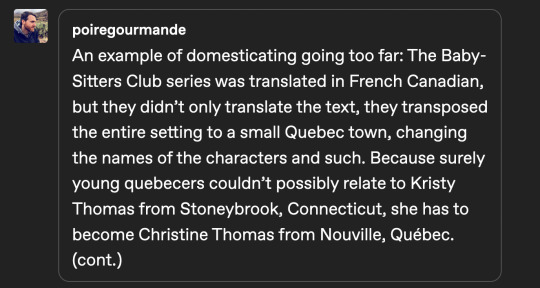
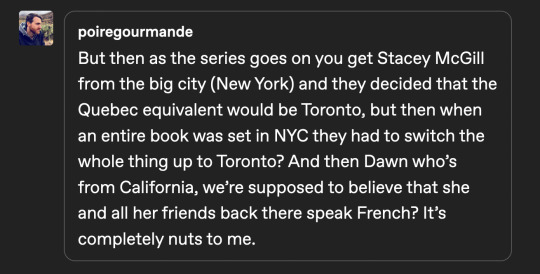
That’s a good example of the perils of domesticating translations! It seems obvious that if you try to adapt an ongoing series by changing a main character’s hometown so it’s more local, at some point you’re going to run into problems, like a whole book where they visit their hometown, which will need an in-depth rewrite so it stays coherent.
The France-French translations of Baby-Sitters Club were still set in the US, so the characters had names that were slightly domesticated so as not to frighten French children, but not so much that it wouldn’t make sense for these girls to be American—e.g. Mary Ann became Mary-Anne vs. Anne-Marie in Québec French, and Dawn and Stacey became Carla and Lucy, which still sounds American to a French kid, but not as unconscionably American as their original names. (Part of it is finding names that won’t be difficult to pronounce—but the Famous Five kids had easily-pronounced names like Julian and Dick, and they still ended up heavily Frenchified, into François and Michel. And the books were set in Brittany in the French translations, instead of England, even though French kids could have handled reading a story that was set five metres to the left.)
I remember feeling puzzled about Nancy Drew at one point, because she’s such a household name in anglo literature and I’d never ever heard of her, so I was like, we’ve translated every other popular anglo series, why have I never seen a Nancy Drew book in a French library? And then I discovered that Alice Roy from the “Alice” book series in French was, in fact, Nancy Drew. It blew my mind—Nancy Drew is Alice!! omg, I did know her this whole time. I read somewhere that the French translation re-named her because French kids would have no idea how to pronounce “Drew” and because they would be more likely to associate “Nancy” with the French city of the same name, so it wouldn’t feel anglo enough. So, amusingly, it was a mix of domesticating and foreignising.
One type of domestication that’s regrettably popular in children’s literature is “temporal” domestication—when you re-translate older books to modernise the language and remove references that would “confuse” today’s kids (not talking about changing aspects of the books that wouldn’t fly with today’s sensibilities, that’s another discussion.) In revised editions of the Famous Five books in the UK, “shall / shan’t” were changed to “will / won’t”, dated words like “horrid” became “horrible”, “trunks” -> “suitcases”, etc. It’s a form of domesticating translation—from 1950s English to modern English. Personally I’m not a fan of it, because in a lot of instances, “modernising” prose for children is synonymous with pruning it and dumbing it down.
In French children’s literature spatial domesticating is losing steam while this kind of temporal domesticating is on the rise—we now feel like French kids can handle reading about an English boy named Julian who lives in England, rather than making the story about François in Brittany, but apparently kids can’t handle reading about a boy who lives in the 1950s and speaks accordingly. In recent re-translations of the Famous Five books they changed the passé simple conjugations to the less complex present, and the “nous” to “on” in the kids’ dialogue among other things, to make the text less formal, more modern—and simpler. The Spanish revised editions have examples of both trends—George calls her father “Padre” in the original translation and “Papá” in the modern one (temporal domesticating—the UK reprints do the same thing, changing “Father” to “Dad”); the kids having tea was initially translated as “tomar el té”, while the new translation changed it to “merendar” (spatial domesticating—and sure, it’s a similar enough concept, but it erases cultural differences. If you’re reading about English kids you can accept that they refer to their snack time as la hora del té rather than la merienda...)
Idk, I think kids who enjoy reading can handle books about fictional children that don’t live and talk just as they do; identifying with people who are quite different from you is part of the fun of reading. I remember reading as a kid the Comtesse de Ségur children’s books which were written under Napoléon III, and the 19th century language was a delightful aspect of them—the fact that little kids my age used imperfect subjunctive in casual conversation was hilarious to me. I was saying in my previous post that domesticating your translation too much evinces a lack of respect for your reader’s ability to handle unfamiliar concepts, and I think we should try to have a little more respect for children in that regard.
#some amount of temporal domesticating can be good so you don't have a completely different experience of a text than#a person from the time period when it was written#e.g. ancient greek classics (as someone mentioned on that other post) which have often been too heavily foreignised in translation#and end up being perceived as abstruse or academic when they initially told a story that could be enjoyed by the average person#but come on let's not do this for texts that have been published in our parents' lifetimes#anyway i'm sorry this is supposed to be a llama blog
3K notes
·
View notes
Note
Do all of the knights have names in your au? And how did you decide on them?
hello there, thank you so much for the message! correct me if I misunderstand, but I think this is about a panel from my galacta knight vs meta knight comic:

where Galacta Knight uses the word Vaýtita. it's not a name, it's a... actually you know what, it's so much more embarrassing! it's a term of endearment/a relationship designator from my unnecessarily complex whole entire sci-fi language i built for them, lmao 💦
here's the note at the beginning of my personal dictionary as a quick crash course:

Ei Vaýtita in particular means "my gravity". it's akin to words like beloved, my heart, or soulmate- an irresistible force in one's own life. it's usually used romantically, but it doesn't have to be. Galacta Knight says it here to be cruel, though i do think he means it quite wholly
when I go in for making languages, especially sci-fi or high-fantasy ones, i like to consider the alien culture that the language is formed in. for these guys, everything was star and space coded; they had no reason to care about "hearts" or "souls". they considered themselves star-like, and so gravity as a term was most important; it's the only thing that can really move them.
praise is about being bright or shiny or having strong gravitational pull; and insults, accordingly, tend to revolve around being dim/lightless or stuck in orbit around someone greater
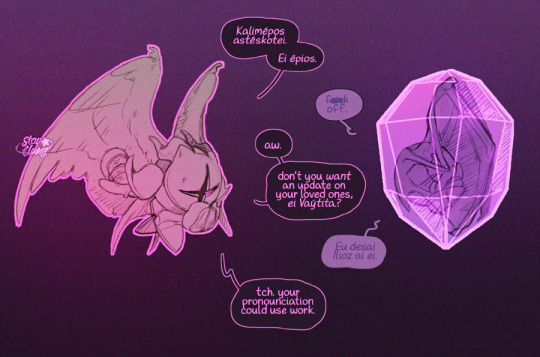
(translation under the cut because this is already getting long, sorry... i love to talk about this... thank you for asking 😭💝)
phrase // literal translation (from starspeak) // english localisation or meaning
kalimépos // welcome first light // good morning
astéskotei // dim star // derogatory but not blindingly so; you could use it pityingly or fondly in a pinch
ei épios // me see // wake up
ei Vaýtita // my gravity // term of endearment and a relationship designator used within a star-system, usually for equal partners
eu desai Ílioz ai ei // you (are not) the Sun of me // this is basically just a rejection from Meta Knight. the Sun serves an important role in star-systems, and he's simply telling Galacta Knight to shove it. he doesn't say it very well, but he refuses to say Ílioz-ei and so turns to a slightly clunky workaround.
#galacta knight#meta knight#my art#starspeak#awtdy au#asks#i do not speak any greek (modern or ancient) or arabic and rely on google translate entirely#originally designed this language entirely for self-indulgent personal use so it's got its flaws and is ever-growing and changing#i formally apologise to any actual speakers to whom this probably looks very stupid as it is truly just words slammed around in the blender#if they mean anything in OTHER languages also i apologise; i try to make sure that they don't translate to anything but it's tricky!#was just obsessed with the idea of utilising existing cosmic designation conventions for their dumb ancient star language#also to the person who referred to this on my main comic as meta knight being ring-popped thank you for my life i loved that#my headcanons and worldbuilding
208 notes
·
View notes
Text
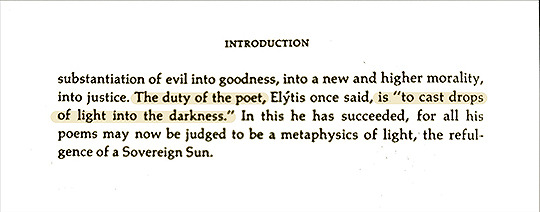
from the introduction to "the sovereign sun" selected poems by odysseus elytis, trans. and introduction by kimon friar. [id in alt text]
#poetry.#kimon friar.#odysseus elytis.#ancient greek poetry.#rereading the sovereign sun as summer sweeps to a close and this stuck out so lovingly.#i remember finding this book tucked away in a small and unfrequented section of my library a handful of years ago.#it swept something in me / something ancient and full of light.#i had to find my own used copy as soon as i realized i couldn't keep it / mark it as my own. there is such love taken into it?#the translation of so much intimate glory and understanding of the universe / of life? the attempt of it.#it feels crafted so carefully. the importance something that could not be understated? i return to it every couple of years -#to reignite that spark. the language in it is just. spellbinding. it reminds me of a warm breeze at twilight / where the light is dim /#and everything feels possible in a way it was not before.#might post more of my favourites !!! just had to share this ending piece of the introduction 💕
347 notes
·
View notes
Text
My number one classics ick is when a scholar will just insert untranslated passages of Greek and Latin into their paper. good job on the artificial inaccessibility you guys, glad you were able to gatekeep the field so none of those dirty peasants may learn stuff. its just for us cool guys who speak Greek or Latin
#This is my speaking as a classical archaeologist who can read very rudimentary Latin and pretty much no Greek#I just never got offered the classes and they weren't a requirement#I'd love if I could and I've been trying to learn latin on my own for a while but self teaching a language isn't exactly easy#I know just enough that if I find a translation that feels off I can get a dictionary and the original and see how it might be phrased#I do need a second translation too to help me find my way#classics#ancient history#tagamemnon#ancient rome#ancient greece#latin#latin literature#greek#greek literature#academics#ick
152 notes
·
View notes
Text
ἐγὼ μὲν οὐκ ἔχοιμ᾽ ἂν εὖ λέγειν τύχην,
χρὴ δ᾽, ἥτις ἐστί, καρτερεῖν θεοῦ δόσιν
"I could never bring myself to say that fate is kind,
but we must endure what the gods give, whatever that may be."
— Euripides, Alcestis
#classics#classical antiquity#antiquity#ancient greece#ancient greek#greek tragedy#classical literature#classical language#euripides#alcestis#euripidesposting#translations#greek translations
144 notes
·
View notes
Text
Bashing my head in the ground and sobbing at how Briseis and Patroclus mirror the kind relationship (both platonic and somewhat familiar) with Helen and Hector. How they both treated the women with kindness and respect, how both women mourn their deaths and are given their dialogue to do so. How both women were trophies of war to a man that took them away from their first husband, but Patroclus swore to Briseis how she will be revered as the legitimate wife of the hero Achilles, and Hector stood up for Helen all time, both as friends. How they both wailed out to the deaths of the beloved heroes, merciless in battle and kind to their people, faithful to their loves all the same.
No one stop me I'm moving to the sea to drown my sorrows.
#This was mostly about the m and f platonic friendships but I also want to say that Patroclus and Hector mirror each other quite a lot#which makes me wonder if. down to their deaths. this simily was supposed to be intentional#i might have to keep some notes on this but anyways#SOBBING YOU KNOW IM WEAK FOR WOMEN BEING RESPECTED IN ANCIENT TIMES#ESPECIALLY WHEN IT ISNT JUST THEIR HUSBANDS BUT OTHER MEN AS WELL LIKE PLEASEEEE#right tags#tagamemnon#briseis#hector of troy#helen of troy#helen of sparta#patroclus#illiad#the illiad#greek mythology#i cant put the translations bc i keep reading this bitch in spanish
69 notes
·
View notes
Text
"In a famous scene in Book 6 of 'The Iliad,' Andromache, accompanied by her baby son and enslaved nurse, begs her husband, the great Trojan warrior Hector, to adopt a less dangerous military strategy, rather than face the enemy on the open plain. He refuses, and they part for the last time. In the original Greek, the wife and husband each use the same word to address one another: 'daimonios.' The word is cognate with 'daimōn' — 'spirit' or 'deity' (from which we get the English 'demon') — and presumably suggests, in its most literal sense, that a person is influenced by some superhuman power. Yet it is surprisingly common in Homer, generally used when one individual addresses another. It is sometimes taken to suggest little more than 'Sir' or 'Ma’am'; sometimes the context suggests it is negative ('possessed' or 'crazy'), sometimes the opposite ('You marvelous person!').
Many translators of this scene use different renditions of the word in the two instances. In Lattimore, Andromache calls Hector 'Dearest,' while he calls her 'Poor Andromache!'; in Fagles, Andromache calls Hector 'Reckless one,' while Hector calls Andromache 'Dear one'; in Fitzgerald, Andromache uses 'Wild one,' and Hector uses 'Unquiet soul' (a lovely phrase lifted from Shakespeare’s 'Merchant of Venice' — although oral poetry does not abound in clever literary quotations). I felt it was important to use the same word for both the wife addressing the husband, and the husband addressing the wife, to echo the symmetry suggested in the original, and I used 'strange' in both instances ('strange man … strange woman,' echoing the different genders of the original). I hoped that this word might hint at the Greek term’s suggestion of something unusual, perhaps divine or inhuman. This heartbreaking scene evokes both deep intimacy and profound estrangement between husband and wife, one of whom will soon be dead and the other enslaved."
- Emily Wilson, from "Emily Wilson on 5 crucial decisions she made in her ‘Iliad’ translation." Washington Post, 20 September 2023.
#i'm so intrigued by this new iliad translation that just came out!#emily wilson#quote#quotations#homer#the iliad#hector of troy#andromache of troy#hector and andromache#ancient greek language#classics
176 notes
·
View notes
Text
Human beings exist for the sake of one another: so, either teach them or endure them.
Οἱ ἄνθρωποι γεγόνασιν ἀλλήλων ἕνεκεν: ἢ δίδασκε οὖν ἢ φέρε.
--Marcus Aurelius, Meditations VIII.59
#quote#quotes#classics#tagamemnon#Marcus Aurelius#Meditations#philosophy#ancient philosophy#Stoicism#Greek#Greek language#Greek translation#Ancient Greek#Ancient Greek language#Ancient Greek translation
353 notes
·
View notes
Text
Obsessed with this
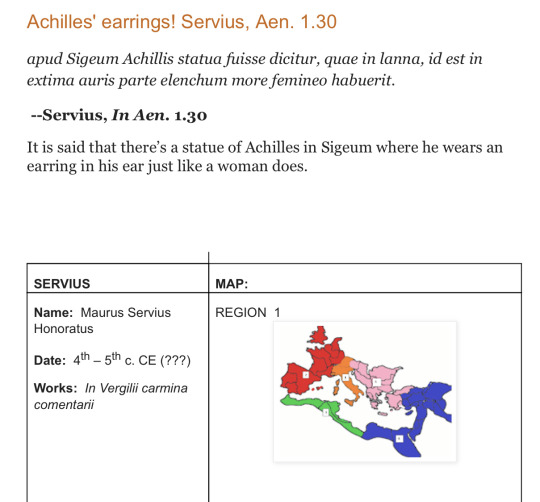
#the website is lgbtmeetsspqr#i love it#it’s about texts in Latin and Ancient Greek that have queer themes#it tells you the author time and place (if we know it) and the translation in English is below#achilles#tagamemnon
89 notes
·
View notes
Text
“People nowadays prefer modern music”
- Telemachus, ~1200 BC
(Actual verse in the Odyssey*)
#*#the closest translation would be#that people prefer the singing that seems the newest to them#Homer#odyssey#telemachus#Ancient Greek literature#Homeric epics#Greece#funny#random#Greek literature#Ancient Greek#Greek culture
81 notes
·
View notes
Text
i really have to get into the distribution of roles among the three actors. just saw a footnote saying that the only other voice in antigone that matches the authority and assurance with which antigone speaks is tiresias, who would have presumably been played by the same actor. well.
#i saw a production of antigone recently where the director (and maybe translator?) was clearly very nervous about minor characters#and the tendency in ancient tragedy (under the limit of three actors) to have a character show up for a scene and never be mentioned again#but tiresias was the one place that didnt play out and the only place they were comfortable having a one-scene character#how is a greek chorus like a lawyer#mine#bodycostume
68 notes
·
View notes
Text
what do you mean the word πάλλω (sway) is used both to describe Hector brandishing his spear and rocking his son in his arms. what do you mean the same word is used
[πάλλων δ᾽ ὀξέα δοῦρα (6.104) brandishing his sharp spears and ὃν φίλον υἱὸν ἐπεὶ κύσε πῆλέ τε χερσὶν (6.474) after he kissed his dear son and rocked him in his arms]
#i'm going to be ill#the iliad#hector of troy#astyanax#ancient greek#πηλε is typically translated like toss or swing which works too#but i don't know#the waving motion feels more obvious with rock#i really don't know what to do with this information#but it makes me feel things#dys blurbs
66 notes
·
View notes